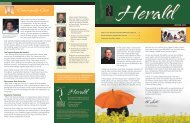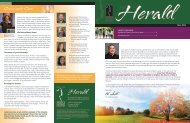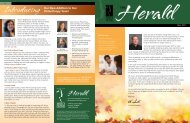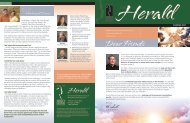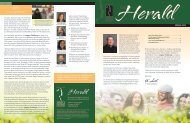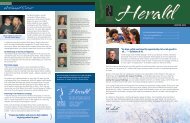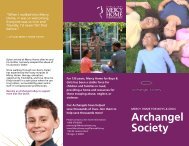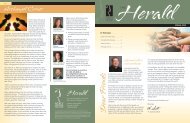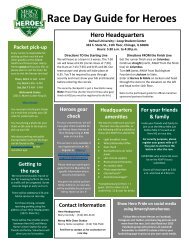Estate Planning Roundtable - Crain's Chicago Business
- No tags were found...
Create successful ePaper yourself
Turn your PDF publications into a flip-book with our unique Google optimized e-Paper software.
WEALTH MANAGEMENT<br />
ESTATE PLANNING ISSUES AND OUTLOOK<br />
The COVID-19 pandemic underscored the importance of estate planning, as individuals realized their own mortality—perhaps<br />
more than ever before. Four <strong>Chicago</strong>-area executives involved with the process shared their insights on creating (or revising) a<br />
comprehensive estate plan so that in the event of incapacity or death, one’s wishes can be heard and carried out.<br />
How is your organization<br />
involved with estate<br />
planning?<br />
Kathryn Kennedy: As a<br />
comprehensive wealth management<br />
firm, Cerity Partners believes<br />
estate planning is integral to<br />
the complete financial health<br />
of a family. We encourage our<br />
clients to address estate planning<br />
issues and we work with them to<br />
determine their goals for their<br />
assets in the event of their death or<br />
incapacity. As financial advisors,<br />
we’re in a unique position to<br />
have a deeper understanding of<br />
a client’s entire financial picture,<br />
so we can help facilitate the<br />
conversation between clients and<br />
attorneys, review and monitor<br />
the entire process and oversee the<br />
implementation of the final plan.<br />
Karen R. Mills: Aronberg<br />
Goldgehn’s estate planning and<br />
probate litigation attorneys work<br />
closely with clients to create a<br />
comprehensive plan ensuring that<br />
their wishes are put into effect upon<br />
incapacity and death. We design<br />
estate plans to avoid litigation<br />
during the client’s lifetime and after<br />
they pass away, and where litigation<br />
is unavoidable, we have significant<br />
experience in estate and trust<br />
disputes. Finally, we work closely<br />
with our clients’ other trusted<br />
advisors to clarify and facilitate<br />
estate planning wishes to give them<br />
and their families peace of mind.<br />
Phil Zielinski: Mercy Home is<br />
a children’s charity in the heart of<br />
<strong>Chicago</strong> that offers solutions for<br />
kids affected by abuse, neglect,<br />
violence, homelessness or other<br />
traumatic experiences. As a<br />
nonprofit, we receive donations<br />
from a variety of sources, including<br />
a large number of charitable<br />
bequests from donors’ estates.<br />
In fact, posthumous gifts make<br />
up nearly 25 percent of Mercy<br />
Home’s operating budget each<br />
year—a significant sum driven<br />
by a strong belief in our mission<br />
and the desire to leave a legacy for<br />
children in need. We have a team of<br />
philanthropic advisors committed<br />
to showing donors how to leave a<br />
charitable bequest and still provide<br />
for their own families, while also<br />
limiting tax exposure for their heirs.<br />
Rebekah Berry: Baird’s estate<br />
planning department has evolved<br />
over the last two years, doubling<br />
the number of estate planners and<br />
increasing the focus on education<br />
and “qualitative” estate planning.<br />
Prior to the higher estate tax<br />
exemptions that came into effect in<br />
2018, our team was more focused on<br />
the quantitative results on a client’s<br />
death. Today’s higher exemptions<br />
mean that fewer clients have estate<br />
tax issues, but those same clients<br />
are still transferring a meaningful<br />
amount of wealth. Regardless of<br />
whether an estate tax exists, making<br />
sure that our clients understand<br />
how their plans are designed and<br />
the options available give them<br />
the confidence to make informed<br />
decisions regarding their estate<br />
planning documents.<br />
What’s the most common<br />
question or concern you<br />
hear about the process?<br />
Mills: Clients want to know how<br />
to address family issues. Blended<br />
families, past relationships, a special<br />
needs child or an addicted family<br />
member can seem unresolvable<br />
to clients. Not knowing where<br />
to start can paralyze a client and<br />
we communicate the importance<br />
our estate planners is their ability<br />
to make it easier for clients to<br />
understand the documents. While<br />
reviewing drafts with clients, our<br />
estate planners ask questions to<br />
make sure clients know what the<br />
plan is stating and to confirm that it<br />
accurately reflects what they want.<br />
Kennedy: People often assume<br />
that estate planning only needs<br />
to be done once. But the reality<br />
is an estate plan may change<br />
over time. To accommodate the<br />
inevitable changes in life, most<br />
of the documents that we help to<br />
create are very flexible. No estate<br />
plan can anticipate every single<br />
possibility, but a strategic and welldrafted<br />
plan will have significant<br />
flexibility to help a family negotiate<br />
the challenges ahead. With that in<br />
mind, there’s great value to having<br />
one’s wishes memorialized. We<br />
monitor established estate plans to<br />
ensure that they’re still achieving<br />
the clients’ goals as both legislative<br />
environments and family dynamics<br />
may shift.<br />
Discover the power<br />
in partnership<br />
For decades, Baird has been a trusted financial partner to families like yours.<br />
Our only priority is a thorough understanding of your needs and concerns –<br />
what’s most important to you. Let us put a century of insight and expertise<br />
to work for you.<br />
<br />
©2021 Robert W. Baird & Co. Incorporated. Member SIPC. MC-603814.<br />
bairdchicago.com<br />
800-79-BAIRD<br />
“THE UNPREDICTABILITY OF THE PAST<br />
YEAR AS WELL AS THE PROXIMITY—AND<br />
DISTANCE—OF FAMILY HAS BROUGHT<br />
SPECIAL FOCUS ON THE NEED TO PLAN.”<br />
—KATHRYN KENNEDY, CERITY PARTNERS<br />
of creating a plan that works for<br />
them and their family members.<br />
Occasionally, spouses don’t agree<br />
and as such, they want to avoid<br />
dealing with conflict. During client<br />
meetings, we listen, acknowledge<br />
what we’ve heard and assure them<br />
that we can develop appropriate<br />
solutions for their particular needs.<br />
Berry: People wonder how they’ll<br />
know if the attorney captured<br />
everything that they wanted<br />
inside their estate plan. We review<br />
draft documents with clients<br />
to ensure that their wishes are<br />
being addressed. Breaking down<br />
the legalese of estate planning<br />
documents can be challenging.<br />
One advantage of working with<br />
Zielinski: Most people who reach<br />
out to discuss their estate plan are<br />
looking to add a charity to their list<br />
of beneficiaries and are wondering<br />
how best to go about this. Often, it’s<br />
as simple as adding their favorite<br />
charities as “residual beneficiaries”<br />
in the trust—in other words, after all<br />
friends and family receive specific<br />
gifts, the rest falls to charity. But<br />
others ask how best to divvy specific<br />
assets between loved ones and<br />
charities. It’s usually best to leave<br />
untaxed assets such as a brokerage<br />
account to family members, and<br />
name a nonprofit as the beneficiary<br />
of any highly-taxed assets, such as a<br />
retirement plan. This way, children<br />
will receive the full value of their<br />
parents’ stock portfolios. And the
SPONSORED CONTENT<br />
a stream of income to a charity<br />
or a pool of money at a specific<br />
term of years to a charity. These<br />
options have specific income and<br />
estate tax benefits. Alternatively, a<br />
residual portion of an estate may<br />
be earmarked for a designated<br />
charity, a family foundation or a<br />
donor-advised fund. In the latter<br />
two cases, structuring the plan<br />
in this manner is a great way<br />
for individuals and families to<br />
continue a legacy of charitable<br />
giving.<br />
REBEKAH BERRY<br />
Associate Branch Manager<br />
Baird<br />
rberry@rwbaird.com<br />
312-578-2677<br />
favorite tax-exempt nonprofit,<br />
rather than Uncle Sam, will receive<br />
the entirety of the IRA or 401(k).<br />
What typically motivates<br />
people to begin the<br />
estate planning process?<br />
Has that changed since<br />
the COVID-19 pandemic<br />
began?<br />
Berry: The conversation is typically<br />
motivated by a life event such<br />
as a marriage, birth of a child,<br />
a major trip or death of a close<br />
friend or family member. With<br />
COVID, there’s certainly been an<br />
uptick in clients reviewing their<br />
circumstances. Advanced health<br />
care directives have become a hotter<br />
topic—so much so that it’s become<br />
the momentum starter for many<br />
clients to create or update their<br />
estate plans.<br />
Kennedy: People frequently<br />
begin the process after the passing<br />
or incapacity of a family member or<br />
friend. The unpredictability of the<br />
past year as well as the proximity—<br />
and distance—of family has brought<br />
special focus on the need to plan. The<br />
pandemic also brought restrictions<br />
around access to medical care and<br />
made advocating for loved ones a<br />
challenge. <strong>Estate</strong> planning is that<br />
practical step people can take now<br />
to ensure that their families are<br />
taken care of and that their wishes<br />
are met. In particular, COVID-19<br />
made us realize that a “healthy”<br />
person can suddenly get struck with<br />
adversity. So having a plan in place is<br />
important for everyone.<br />
Zielinski: Big life events will<br />
always be drivers of estate planning.<br />
KATHRYN KENNEDY<br />
Partner<br />
Cerity Partners<br />
kkennedy@ceritypartners.com<br />
312-715-3808<br />
But what we saw at the outset of<br />
the pandemic was a new kind of<br />
milestone—people across all stages<br />
of life were contemplating their<br />
own mortality, including how to<br />
provide for loved ones and how to<br />
make the world a better place for<br />
future generations. The past year<br />
has been painful and challenging<br />
in many ways, but it’s allowed us to<br />
take stock of what’s important. At<br />
Mercy Home, we’re seeing our own<br />
donors recommit to living a life with<br />
meaning, and that shows in their<br />
estate planning as well.<br />
Mills: Sometimes people are<br />
motivated by the fact that they’ve<br />
come into a substantial amount of<br />
money, or they read about changes<br />
in tax laws and are concerned<br />
about how those changes might<br />
affect them and their families.<br />
The COVID-19 pandemic has<br />
significantly increased the number<br />
of calls we’ve received regarding<br />
estate planning and estate<br />
litigation—so much so that we<br />
recently expanded our practice<br />
group and opened a second office.<br />
The pandemic cast a shadow<br />
of uncertainty over our daily<br />
lives, and many of us spent time<br />
thinking about getting their affairs<br />
in order in the event of sickness<br />
or worse. COVID produced a rise<br />
in estate planning, but we believe<br />
many more people still need to<br />
plan. Many individuals believe<br />
they have too few assets to warrant<br />
a will. Others assume their<br />
money will automatically pass<br />
to their family members. Both<br />
those assumptions are incorrect.<br />
Pandemic or no pandemic, the<br />
importance of estate planning<br />
cannot be overstated.<br />
KAREN R. MILLS<br />
Member<br />
Aronberg Goldgehn<br />
karen.mills@agdglaw.com<br />
312-923-7330<br />
How can charitable<br />
organizations be<br />
integrated into estate<br />
plans?<br />
Zielinski: If you’re charitably<br />
inclined, you should absolutely<br />
include your favorite nonprofits<br />
in your estate plan. This is the<br />
easiest way to make a substantial<br />
gift to the causes near to your<br />
heart. These transformational<br />
gifts cost you nothing now, can<br />
reduce taxes for your estate and<br />
are a terrific way to leave a legacy<br />
for future generations. You can<br />
name a nonprofit in your will<br />
or trust, or as the beneficiary<br />
PHIL ZIELINSKI<br />
Director - Philanthropy<br />
Mercy Home for Boys & Girls<br />
phizie@mercyhome.org<br />
312-738-9527<br />
of your IRA, brokerage or bank<br />
account. I also recommend talking<br />
with your family about your<br />
philanthropic plans. When you<br />
invite younger generations into<br />
the conversation, you’re telling<br />
them what’s important to you, and<br />
what you’re doing to make the<br />
world a better place after you’re<br />
gone. You’re also inviting them to<br />
think of something greater than<br />
themselves, and to support causes<br />
that they believe in.<br />
Kennedy: In lieu of a direct<br />
bequest, there are also trust<br />
vehicles created during the lifetime<br />
of a client that produce either<br />
Comprehensive<br />
Financial Management<br />
for<br />
Individuals, <strong>Business</strong>es<br />
and Nonprofits<br />
®<br />
Berry: Simplicity would say that<br />
it’s easiest to just name the charity<br />
as a beneficiary of an account,<br />
preferably a 401(k) or traditional<br />
IRA, since the charity doesn’t pay<br />
income taxes on the distribution.<br />
However, simplicity may not<br />
achieve the client’s goal, especially<br />
if the charity is the beneficiary of<br />
an account that declines in value<br />
over time. Therefore, the attorney<br />
may prefer to build the charity<br />
into the governing document to<br />
ensure that the charitable goal is<br />
achieved.<br />
Mills: We often suggest naming<br />
the charity as the beneficiary of<br />
part or all of their IRA or other<br />
pension plan. At death, the<br />
client’s estate will get a charitable<br />
deduction for the money going<br />
to the charity and the charity,<br />
because it’s a tax-exempt<br />
organization, will not have to pay<br />
any income tax when the money is<br />
withdrawn.<br />
Individuals & Families<br />
Family Offices<br />
Executives<br />
<strong>Business</strong> Owners<br />
HR Teams<br />
Corporate Boards &<br />
Plan Sponsors<br />
Nonprofits<br />
Holistic Wealth<br />
Management<br />
Executive Financial<br />
Counseling<br />
Corporate Financial<br />
Wellness<br />
Retirement Plan<br />
Advisory<br />
WHO WE SERVE<br />
WHAT WE DO<br />
“IF YOU’RE CHARITABLY INCLINED, YOU<br />
SHOULD ABSOLUTELY INCLUDE YOUR<br />
FAVORITE NONPROFITS IN YOUR ESTATE PLAN.”<br />
—PHIL ZIELINSKI, MERCY HOME FOR BOYS & GIRLS<br />
ABOUT CERITY PARTNERS We are an independent, nationwide, employee-owned firm<br />
that serves as a financial fiduciary to over 6,000 clients. As one of the largest RIAs in the<br />
U.S. ($33 billion in assets under advisement as of 5/13/21), we have the resources and<br />
expertise to help you get from where you are to where you want to be.<br />
Meg Rowley<br />
Partner & <strong>Chicago</strong> Market Leader<br />
P: (312) 715-3805 W: ceritypartners.com
WEALTH MANAGEMENT<br />
ESTATE PLANNING ISSUES AND OUTLOOK<br />
Will factors such as recent<br />
changes in the tax laws and<br />
the current low-interest-rate<br />
environment affect estate<br />
planning?<br />
Zielinski: The 2019 SECURE<br />
Act significantly changed how<br />
retirement assets can be left to heirs.<br />
As a result of this law, non-spousal<br />
IRA or 401(k) beneficiaries will<br />
now need to withdraw all funds<br />
from retirement accounts within<br />
10 years of the account holder’s<br />
death. Because these beneficiaries<br />
have a shorter timeline to receive<br />
IRA distributions, they also miss<br />
out on tax deferral for these assets,<br />
and compress their tax liability<br />
into a decade or less. The good<br />
news is that naming your favorite<br />
nonprofit as a beneficiary of your<br />
retirement account instead of a<br />
child or grandchild can be a winwin.<br />
You can give a substantial gift<br />
to a tax-exempt nonprofit, receive a<br />
charitable deduction for your estate<br />
and leave other tax-advantaged<br />
assets to your loved ones instead.<br />
Berry: More than ever, clients<br />
are evaluating lifetime wealth<br />
transfer planning strategies,<br />
with the expectation that the tax<br />
laws will change in 2022. Wealth<br />
transfer in a low-interest-rate<br />
environment often entails making<br />
loans to younger family members<br />
at low interest rates. This allows<br />
younger family members to use<br />
the funds to purchase real estate<br />
or marketable securities and have<br />
an opportunity to outpace the IRS<br />
issued rate, building wealth beyond<br />
the repayment amount. Individuals<br />
can also use the low-interest-rate<br />
environment to generate wealth<br />
beyond the IRS assumed rate<br />
of return for a certain period. If<br />
the investments outperform the<br />
assumed interest rate for that<br />
particular period,<br />
then additional wealth can be<br />
transferred to heirs without any gift<br />
or estate taxes.<br />
Mills: Recent changes that<br />
increased the federal estate and<br />
gift tax exemption to over $23<br />
million for a married couple<br />
reduced the number of families<br />
subject to federal estate taxes. But<br />
in Illinois, estate taxes begin at<br />
$4 million for individuals and $8<br />
million for couples—so a much<br />
lower exemption amount. Current<br />
low interest rates provide many<br />
opportunities to shift income<br />
and capital to junior generations<br />
without an estate or gift tax cost.<br />
Current inflation concerns may<br />
cause interest rate increases which<br />
will reduce the effectiveness of<br />
many of today’s popular strategies.<br />
This puts an increased emphasis<br />
on taking current action to take<br />
advantage of these lower rates<br />
while they are still available.<br />
Kennedy: Significant changes to<br />
estate tax laws are part of proposed<br />
tax legislation for individuals and<br />
families. These changes, combined<br />
with the current low-interest-rate<br />
environment create an urgent<br />
opportunity to plan now for issues<br />
such as a reduction in the lifetime<br />
estate and gift tax exemption.<br />
Tools like interfamily loans,<br />
grantor-retained annuity trusts and<br />
intentionally defective grantor trusts<br />
are at risk of being diminished as<br />
attractive opportunities to reduce<br />
“CLIENTS ARE EVALUATING LIFETIME<br />
WEALTH TRANSFER PLANNING STRATEGIES,<br />
WITH THE EXPECTATION THAT THE TAX<br />
LAWS WILL CHANGE IN 2022.”<br />
— REBEKAH BERRY, BAIRD<br />
estate tax. Every client with a<br />
current or potential net worth above<br />
$7 million should sit down with<br />
their team to evaluate how to best<br />
meet their needs and goals.<br />
What planning measures<br />
should small business<br />
owners, in particular, have<br />
in place to protect their<br />
business and the assets?<br />
Kennedy: <strong>Business</strong> owners<br />
often focus on running the dayto-day<br />
operations of their business<br />
and overlook making plans to<br />
best preserve their legacy upon<br />
death, retirement or disability. We<br />
establish a succession plan with<br />
our clients—whether it’s a transfer<br />
of ownership through an outright<br />
sale or an agreement with partners<br />
or employees. Plans like these<br />
can include life insurance on key<br />
employees, buy-sell agreements and<br />
other ownership arrangements that<br />
can be tailored to your business needs.<br />
Mills: <strong>Business</strong> owners should<br />
take steps to ensure that business<br />
liabilities don’t put their personal<br />
assets at risk. First and foremost,<br />
they should utilize business<br />
entities to separate their personal<br />
assets from business liabilities.<br />
In connection with estate<br />
planning, they should consider<br />
comprehensive asset protection<br />
planning which may include setting<br />
up a family limited partnership or<br />
family limited liability company<br />
in which other family members—<br />
or trusts for their benefit—are<br />
partners/members.<br />
Berry: <strong>Business</strong> owners should<br />
consider a “base” comprehensive<br />
estate plan layered with additional<br />
documents such as articles<br />
of incorporation, buy-sell<br />
agreement(s), and shareholder<br />
agreement(s). They should discuss<br />
asset protection planning strategies<br />
with their estate-planning attorney<br />
prior to the business creation, so<br />
that the attorney can weigh options<br />
such as a domestic asset protection<br />
trust to prevent creditors from being<br />
able to attach themselves to the trust<br />
assets.<br />
Zielinski: We have a number of<br />
family businesses interested in<br />
creating a charitable remainder<br />
trust. These vehicles allow you to<br />
provide a steady stream of income<br />
for yourself or your loved ones<br />
during life, and leave a charitable<br />
bequest to your favorite charity<br />
upon your passing. And because a<br />
CRT is an irrevocable gift, you’ll be<br />
eligible for a charitable deduction in<br />
the year of the gift as well.<br />
<strong>Estate</strong> planning can be an<br />
overwhelming topic; how<br />
should an individual begin?<br />
Berry: We focus on a four-stage,<br />
iterative process that begins with an<br />
in-depth education phase followed<br />
by a review of draft documents.<br />
Once the client’s estate plan has<br />
been updated or implemented, we<br />
create a flow chart of the estate plan<br />
to be used in future annual meetings<br />
and future family meetings. My<br />
advice to individuals is to get<br />
educated and set up a meeting with<br />
an attorney, and to give yourself a<br />
deadline. I recommend having a net<br />
worth statement generated out of<br />
your financial plan and preparing<br />
a contact list of family members,<br />
friends and charities that you want<br />
to include in your estate plan. Also,<br />
be prepared to discuss your family<br />
values and goals, as this information<br />
will guide the attorney in drafting<br />
the documents.<br />
Zielinski: The first thing to<br />
remember is that estate planning is<br />
for everyone – not just the wealthy.<br />
Step two is to reach out to an estate<br />
planning attorney to discuss your<br />
needs and build a team of advisors,<br />
if needed. In the past decade, a<br />
number of online resources have<br />
become available for basic estate<br />
planning. But for the vast majority<br />
of people, an attorney is the way to<br />
go. There’s a cost associated with<br />
this on the front end, of course, but<br />
because you’ll receive individualized<br />
service and expertise, it’s almost<br />
always worth it.<br />
Kennedy: The first step is to<br />
start the conversation. We believe<br />
that estate planning is important<br />
to address in our first year of<br />
work with a new client. At Cerity
SPONSORED CONTENT<br />
ABOUT THE PANELISTS<br />
REBEKAH BERRY<br />
is associate<br />
branch manager<br />
at the Elgin<br />
office of Baird,<br />
a multinational<br />
independent<br />
investment<br />
bank and financial services<br />
company. She provides<br />
private wealth management<br />
strategic direction—from the<br />
development of the plan itself<br />
to the execution of the action<br />
steps necessary to achieve a<br />
successful outcome. She has<br />
more than 20 years of industry<br />
experience and is a certified<br />
financial planner (CFP) and<br />
certified divorce financial<br />
analyst (CDFA).<br />
KATE KENNEDY is a<br />
<strong>Chicago</strong>-based partner<br />
®<br />
at Cerity Partners, a<br />
wealth management and<br />
retirement consulting firm<br />
with offices nationwide. She leads the firm’s Midwest<br />
executive financial counseling practice, providing<br />
comprehensive wealth management services to<br />
corporate executives and high-net-worth individuals and families. She<br />
has more than 27 years of industry experience, including financial<br />
counseling, taxes, investments, wealth transfer plans and charitable<br />
initiatives. She is a certified public accountant (CPA), a certified<br />
financial planner (CFP) and a member of the Illinois Bar.<br />
KAREN R. MILLS is a member of Aronberg Goldgehn, a<br />
full-service business law and litigation firm with offices in<br />
<strong>Chicago</strong> and Wheaton. She concentrates her practice<br />
on estate planning, trust and estate administration,<br />
probate litigation, special needs planning, asset<br />
protection and guardianships for minors and disabled<br />
adults. Earlier in her career, she spent nearly 20 years<br />
at JPMorgan Chase and BMO Harris Private Bank advising clients<br />
on trusts, estates, guardianships and wealth<br />
management issues.<br />
PHIL ZIELINSKI<br />
is director of<br />
philanthropy for<br />
Mercy Home for<br />
Boys & Girls, a<br />
residential care<br />
facility that has<br />
served kids in crisis since 1887.<br />
He advises donors on the most<br />
tax-efficient ways to support<br />
their favorite charitable causes,<br />
whether with outright gifts of<br />
cash or through planned giving<br />
vehicles. His work emphasizes<br />
charitable bequests, retirement<br />
assets, donor advised funds and<br />
gifts of stock. He has 15 years<br />
of experience in the nonprofit<br />
sector, and is a certified fundraising<br />
executive (CFRE).<br />
Partners, we want you as our client<br />
to understand the complexities of<br />
the current financial, legal and tax<br />
landscape. We believe our role is to<br />
see the big picture and ultimately<br />
keep your team of professionals in<br />
sync with your goals and needs.<br />
Mills: We like to remind our<br />
clients that a well-planned estate<br />
plan is one of the most thoughtful<br />
gifts they can give their loved ones.<br />
We work closely with clients to<br />
ensure that their wishes are heard,<br />
that their questions are adequately<br />
addressed and that sound decisions<br />
are made surrounding their plan.<br />
While creating an estate plan<br />
may seem like an overwhelming<br />
process, the burden can be eased<br />
by the individual identifying who<br />
they’d like to help them if they’re<br />
incapacitated and after they pass<br />
away, what their estate consists of,<br />
who their beneficiaries are and what<br />
they’d like them to receive upon<br />
their death.<br />
a minimum, individuals recognize<br />
that they should have powers<br />
of attorney for health care and<br />
property. The pandemic has brought<br />
the realities of incapacity and death<br />
front and center for many clients.<br />
Zielinski: Since the beginning of<br />
the pandemic, we’ve seen a dramatic<br />
increase in the number of donors<br />
interested in leaving a legacy gift to<br />
the kids at Mercy Home. This past<br />
year has given us all a chance to<br />
think about our own lives, values<br />
and legacies, and reflect on what’s<br />
most important to us. After all,<br />
a core question your estate plan<br />
should seek to answer is, “How will<br />
you define your own legacy?”<br />
Kennedy: The COVID-19<br />
pandemic highlighted the<br />
importance of being prepared<br />
in the event of a catastrophic<br />
life event. We all know someone<br />
the virus impacted, and we<br />
witnessed the adversity that<br />
little to no planning had on<br />
Berry: The long-lasting effect<br />
will surely be in the charitable<br />
giving space. More than ever,<br />
communities need the support of<br />
their charitable partners. As we’ve<br />
seen with the CARES Act, the<br />
government is providing tax breaks<br />
for individuals and corporations<br />
that are making cash donations to<br />
public charities. A mental health<br />
crisis is looming and charities<br />
will be asking for even more<br />
support in the coming years to<br />
combat the downstream impacts<br />
of the pandemic. The creation of<br />
rainy-day funds has never been so<br />
important and I’d anticipate that<br />
clients will try to create long-term<br />
trusts for their heirs to provide a<br />
source of funds in the event of the<br />
unknown. Long-term trusts have<br />
historically been created to pass<br />
on wealth to the next generation<br />
and avoid a beneficiary’s predators.<br />
Now these trusts will be favored for<br />
providing cash flow during extreme<br />
economic and world events.<br />
“BUSINESS OWNERS SHOULD TAKE STEPS TO<br />
ENSURE THAT BUSINESS LIABILITIES DON’T<br />
PUT THEIR PERSONAL ASSETS AT RISK.”<br />
– KAREN R. MILLS, ARONBERG GOLDGEHN<br />
What long-lasting effects<br />
will the coronavirus<br />
pandemic have on estate<br />
planning?<br />
Mills: COVID-19 has caused many<br />
people to realize that life is precious,<br />
circumstances can change quickly<br />
and they need to be prepared. At<br />
those individuals. The pandemic<br />
brought important health care<br />
decisions to the forefront of<br />
people’s minds. Establishing these<br />
health care documents now, and<br />
talking with family members<br />
about your wishes has an<br />
immediate benefit, giving you—<br />
and them—peace of mind.




